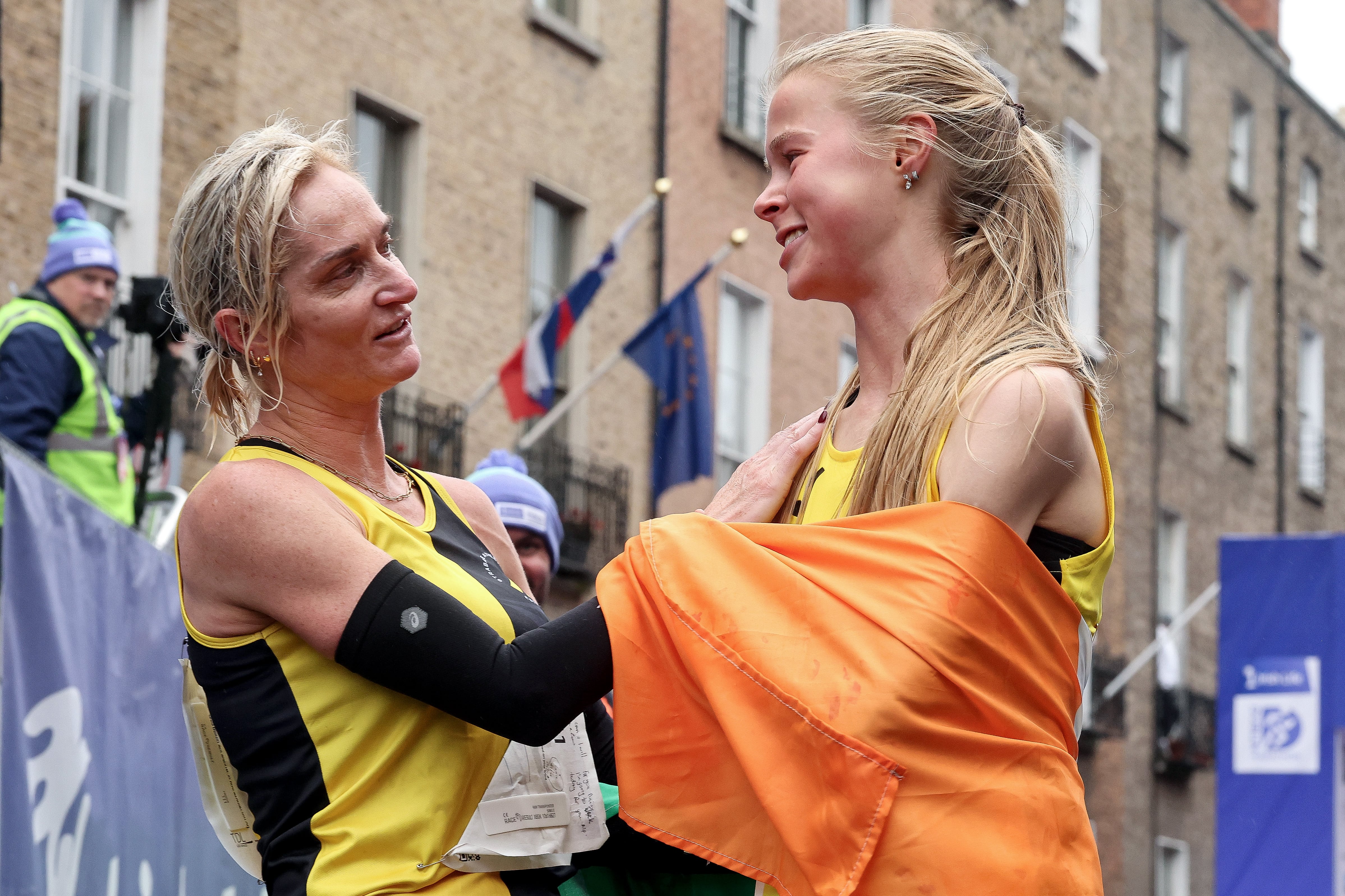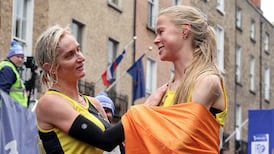Only a certain generation of running aficionados will have felt any sense of déjà vu at the finish line of the Dublin Marathon last Sunday.
The fresh face and name, running so far and so fast, yet still so impossibly young …
Because maybe the best way to contextualise what Ava Crean achieved in winning the women’s national title is to go back to the first running of the event, on the October bank holiday of 1980.
Earning her place in Irish athletics history that day was Carey May - and 45 years later there are still plenty of lessons in what she achieved.
READ MORE
May had just turned 21, so was a couple of years older than Crean, who is still only 19.
Women’s long-distance running was also in a very different place in 1980, and May had to endure all sorts of obstacles – before, during and after the race. Starting with that notion no woman of any age should even consider running 26.2 miles.
It was just over a decade since Kathrine Switzer faced a very different sort of wall in the 1967 Boston Marathon, when race codirector Jock Semple tried to push her to the ground and rip off her race number.
It was also another four years after the 1980 Dublin Marathon before women were allowed to compete in the Olympic marathon, thanks to a late flurry of appeals before Los Angeles in 1984.

Like Crean, May was still a novice by all distance-running standards, discovering the classic distance just a few months before, when the Ulster Open Marathon was staged in Letterkenny in August 1980. There, May was the first woman among the 45 finishers, her 2:53:18 the first time any Irish woman had run under three hours.
Even if confident of completing the distance, another obstacle presented itself with around two miles to go before the finish on St Stephen’s Green (as she recalled in this newspaper in 2019): “I just remember this old guy running out in front of me, shouting ‘What are doing? Women shouldn’t be doing this!’ But it was nothing I dwelled on. I just kept going.”
May’s 1980 winning time of 2:41:11 was more than 20 minutes ahead of the next-best woman. Still, she wasn’t yet free of her critics, some of whom suggested if she kept running marathons she’d be crippled, or worse, by age 30.

Well, a year later, May won the first women’s national marathon title, running 2:42.39; she was also the first Irish woman to run the European Championship marathon (1982), the World Championship marathon (1983) and that first Olympic marathon for women (1984). So much for running Dublin too soon.
Her victory in 1980 also sent her on another adventure. A year later, May was offered a scholarship to Brigham Young University in Provo, Utah. She then twice won the Osaka International Marathon for women in Japan, her winning time in 1985 of 2:28:07 standing as the Irish record for 12 years, before Catherina McKiernan finally bettered it in 1997, with her winning time of 2:23:44 in Berlin.
McKiernan was two months shy of 28 when she ran her first marathon in Berlin, recording the then fastest debut in women’s marathon history. Her potential for 26.2-mile running was first identified 10 years earlier, during a VO2 max test in Trinity College Dublin carried out by Bernard Donne, still the optimal measurement of how efficiently the body uses oxygen during exercise. McKiernan’s VO2 max was the highest Prof Donne had ever recorded.

In only her second marathon, in London in April 1998, McKiernan won in 2:26:26, 28 seconds ahead of two previous winners – Scotland’s Liz McColgan and Kenya’s Joyce Chepchumba – in a race that prides itself on bringing together the best marathon runners in the world.
Then on November 1st, 1998, she won the Amsterdam Marathon in 2:22:23, which still stands as the Irish record 28 years later, on the day missing the world record by just 96 seconds. It was her peak performance. McKiernan only ran one more elite marathon, finishing 12th in Chicago in 1999 in 2:35:51, before retiring in 2004.
It could be argued that McKiernan possibly came to the marathon too late in her career, and the same with Sonia O’Sullivan. But would that have impacted on all they achieved before?
It was 2000 before O’Sullivan made her debut, a month shy of 31, winning the Dublin Marathon in 2:35:42 on a brutally wet day, just more than a month after winning the Olympic silver medal in the 5,000m in Sydney. O’Sullivan only decided to run Dublin two days before, essentially as a long training run, before attempting her first major marathon in New York in 2002.
That was a different experience, as she struggled from the 16-mile mark and ended up 12th, in 2:32:06. She made one more serious marathon attempt in London in 2005, running her best of 2:29:01 to finish eighth, still almost seven minutes off McKiernan’s Irish record.
The closest any Irish woman has got to that record since is Fionnuala McCormack, who ran 2:23:46 in Valencia last December, four months after she became the first Irish woman to compete in five Olympics. McCormack made her marathon debut in 2014, a month shy of turning 30, and now at 41, she’ll run Sunday’s New York Marathon more confident than ever of challenging that record.

It’s just seven weeks since McCormack produced one of the best runs of her career, finishing ninth in the World Championship marathon in Tokyo, clocking 2:30:16 in stifling conditions. Crean ran 2:34:12 in Dublin last Sunday, where it was a lot cooler, although with any reasonable progression it’s fair to assume she too can challenge the Irish record.
That day could be sooner or later, who knows, but at 19, Crean has already put herself in the same conversation as May, McKiernan, O’Sullivan and McCormack, a new role model for young marathon men and women, and that’s plenty good for now.
Long may she run.
















